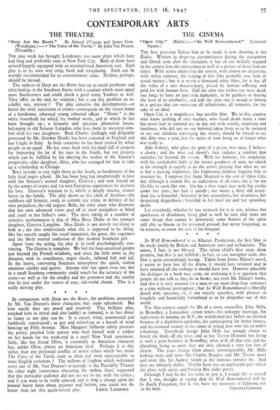CONTEMPORARY ARTS
THE THEATRE
"Deep Are the Roots." By Arnaud d'Usseau and James Gow. (Wyndhams.)—" The Voice of the Turtle." By John Van Druten. (Piccadilly.)
THE past week has brought Londoners two more plays which have had long and profitable runs in New York City. Both of them have arrived happily equipped with an accomplished American cast. Each play is in its own way crisp, fresh and stimulating. Each can be warmly recommended for its entertainment value. Neither, perhaps, should be missed.
The authors of Deep are the Roots face up to racial problems and relationships in the Southern States with a candour which must appal most Southerners and could shock a good many Yankees as well. They offer, in the end, no solution ; but is not this problem an in- soluble one, anyway ? The play concerns the developments--or better the swift succession of events—consequent on the return home of a handsome, educated young coloured officer. "Home " is the white household for which his mother works, and in which he has been brought up ; a leisurely and spacious plantation house, belonging to old Senator Langdon, who lives there in ancestral com- fort with his two daughters. Brett Charles (feelingly and diligently portrayed by Mr. Gordon Heath) has been stationed in England and has fought in Italy. In both countries he has been treated by white people as an equal. He has come back with his head full of projects for improving the lot of his race in the South,. but not projects which can be fulfilled by his obeying the wishes of the Senator's progressive elder daughter, Alice, who has arranged for him to take up a scholarship at Chicago.
Brett intends to stay right there in the South, as headmaster of the little local negro school. He has been long but unadmittedly in love with the Senator's second daughter, Ginevra ; and now forced on by the tempo of events and his own European experiences he declares his love. Ginevra's reaction to it, which is deeply sincere, creates havoc in the family. The play shows us this clash of loyalties—the stubborn old Senator, ready to commit any crime in defence of his own prejudices, the old negress Bella, the elder sister who discovers that her own advanced views peel off to show prejudices as blind and cruel as her father's own. The most taking of a number of sensitive performances is that of Miss Betsy Drake as the younger daughter, Ginevra Langdon. Miss Drake is not merely ravishing to look at ; she also understands what she is supposed to be doing. She has exactly caught the vocal intonation, the grace, the eagerness and the likely mental confusion of this modern Southern girl.
Apart from the acting, the play is in itself psychologically con- vincing. The illusion is complete. We feel the heat-saturated garden just beyond the French windows, and sense the little town in the distance, with its courthouse, negro shacks, railroad halt and jail. In the heavy, enervating Southern atmosphere the quick, violent emotions crackle and quiver. Anyone who has spent even one day in a small Southern community could vouch for the accuracy of the scene—as well as for the crudity and the grossness and the cruelty that lie just under the veneer of easy, old-world charm. This is a really moving play.
* * * *
By comparison with Deep are the Roots, the problems presented by Mr. Van Druten's three characters may seem ephemeral. But how neatly they are posed and resolved. This brilliant play, attacked here as trivial and also (oddly) as immoral, is in fact about as funny as any play can be. It is casual, witty, sentimental and faultlessly constructed ; as gay and refreshing as a breath of wind blowing up Fifth Avenue. Miss Margaret Sullavan subtly presents the pretty, puzzled little actress who finds herself with a soldier on her hands for the week-end in a small New York apartment. Sally, like her friend Olive, is essentially an American character but, unlike Olive, almost an American ideal. Perhaps it is this rather than any profound conflict of moral values which has made The Voice of the Turtle seem so alien and even unacceptable to some English reviewers ? The bellows of laughter which welcomed every one of Mr. Van Druten's wisecracks at the Piccadilly Theatre the other night (sometimes obscuring the spoken lines) suggested that this particular audience did not see eye to eye with the critics ; and if you want to be really amused, and to ring a change upon the normal heavy farce about pyjamas and butlers, you could not do
better than see this quick-witted play. LEWIS LADBROKE.


































 Previous page
Previous page